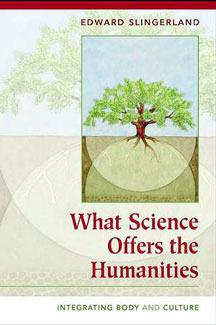 Wabash College will host Edward Slingerland who will give a talk on "Cognitive Science and Early Confucian Ethics" at 8 p.m. Thursday, March 13, in Room 101 (Lovell Lecture Room) in Baxter Hall.
Wabash College will host Edward Slingerland who will give a talk on "Cognitive Science and Early Confucian Ethics" at 8 p.m. Thursday, March 13, in Room 101 (Lovell Lecture Room) in Baxter Hall.
Slingerland is the Associate Professor of Asian Studies at the University of British Columbia. He is also the co-founder and director of the University’s new Centre for the Study of Human Evolution, Cognition, and Culture, and holds the Canada Research Chair in Chinese Thought and Embodied Cognition. He received his B.A. from Stanford in Asian Languages, an M.A. from UC Berkeley in East Asian Languages, and a Ph.D. in Religious Studies from Stanford University. George Lakoff, Professor of Linguistics at UC Berkeley, describes Slingerland as "one of a group of exciting and creative young scholars revolutionizing the study of Chinese history, culture, and religion."
 In 2003 he published Effortless Action, in which he studies the concept of "non-action" in ancient China by using the new technique of "conceptual metaphor analysis." In the same year, he brought out a lucid translation of Confucius’s Analects, which breaks new ground by including extensive excerpts from the traditional Chinese commentaries. Last month he published What Science Offers the Humanities: Integrating Body and Culture (Cambridge, 2008), in which he uses recent scientific discoveries about human cognition to argue for a new integration of the sciences and the humanities. Some of his other research interests include Chinese thought during the Warring States period (453-221 B.C.), the cognitive science of religion and ethics, evolutionary psychology, methodologies for comparative religion and philosophy, virtue ethics, theories of interpretation, and classical Chinese language.
In 2003 he published Effortless Action, in which he studies the concept of "non-action" in ancient China by using the new technique of "conceptual metaphor analysis." In the same year, he brought out a lucid translation of Confucius’s Analects, which breaks new ground by including extensive excerpts from the traditional Chinese commentaries. Last month he published What Science Offers the Humanities: Integrating Body and Culture (Cambridge, 2008), in which he uses recent scientific discoveries about human cognition to argue for a new integration of the sciences and the humanities. Some of his other research interests include Chinese thought during the Warring States period (453-221 B.C.), the cognitive science of religion and ethics, evolutionary psychology, methodologies for comparative religion and philosophy, virtue ethics, theories of interpretation, and classical Chinese language.
His talk is free and open to the public.
For more information see: